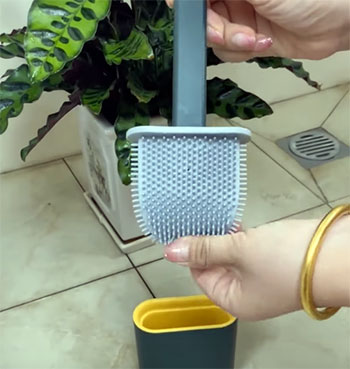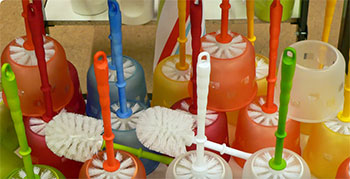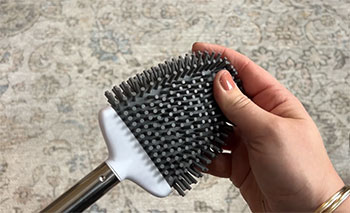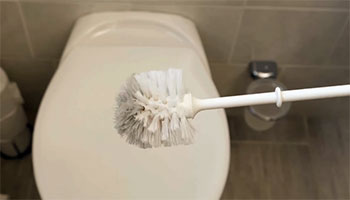Ah, the humble toilet brush – a tool so essential, yet so often overlooked. But fear not, dear readers, for today we’re diving headfirst into the world of toilet brush technology and pitting two titans against each other: the silicone toilet brush and the classic regular brush.
Buckle up, because this is going to be a wild ride through the realms of hygiene, convenience, and, yes, even style.
A Brief Comparison Table
Before we get too deep into the nitty-gritty, let’s kick things off with a handy comparison table:
| Feature | Silicone Toilet Brush | Regular Toilet Brush |
| Material | Silicone | Plastic, nylon, or natural bristles |
| Bristle Flexibility | High | Low to moderate |
| Bristle Durability | High | Moderate to low |
| Cleaning Efficacy | High | Moderate |
| Ease of Cleaning | High | Low |
| Odor Resistance | High | Low |
| Aesthetic Appeal | High | Low to moderate |
Now that you have a bird’s-eye view of these bathroom warriors, let’s dive into the juicy details and explore their strengths and weaknesses.
The Silicone Toilet Brush: The Sleek and Hygienic Contender
The silicone toilet brush is the new kid on the block, and it’s quickly gaining a cult following among hygiene enthusiasts and design aficionados alike. With its sleek, modern aesthetic and innovative silicone construction, this brush is redefining what it means to clean a toilet.

One of the standout features of the silicone toilet brush is its bristle flexibility. Unlike traditional brushes, which can be stiff and unyielding, the silicone bristles bend and conform to every nook and cranny, ensuring a thorough and efficient clean every single time.
But it’s not just about flexibility – these silicone bristles are also incredibly durable. Say goodbye to frayed and worn-out brushes, as the silicone material can withstand years of vigorous scrubbing without showing signs of wear and tear.
And let’s not forget about hygiene. Silicone is naturally resistant to odors, mold, and bacteria, making it an ideal choice for the bathroom environment. With a silicone toilet brush, you can rest assured that your cleaning tool won’t become a breeding ground for unpleasant smells or harmful microorganisms.
Speaking of cleaning, maintaining a silicone toilet brush is a breeze. Simply rinse it off after use, and the non-porous surface will shed any gunk or grime with ease. No more struggling to disinfect those hard-to-reach crevices – the silicone brush keeps things simple and hassle-free.
The Regular Toilet Brush: The Classic Workhorse
While the silicone toilet brush may be the fresh-faced newcomer, let’s not forget the tried-and-true regular toilet brush. This trusty companion has been keeping bathrooms clean for generations, and it’s not going down without a fight.

The classic regular toilet brush typically features sturdy plastic or nylon bristles, sometimes even opting for natural materials like horsehair or palmyra fibers.
These bristles may not have the same flexibility as their silicone counterparts, but they more than make up for it with their rugged durability and scrubbing power.
For those tough, stubborn stains that just won’t budge, the regular toilet brush can be an invaluable ally. Its stiff bristles can tackle even the most tenacious grime, ensuring that your toilet bowl sparkles like new.
Of course, with great scrubbing power comes great responsibility. Regular toilet brushes can be a bit trickier to clean and maintain. Those bristles can easily harbor bacteria, odors, and residual gunk, requiring frequent disinfecting and replacement to maintain optimal hygiene.
But for those who value tradition and familiarity, the regular toilet brush is a comforting presence in the bathroom. Its no-frills design and straightforward functionality have stood the test of time, making it a reliable choice for generations of homeowners.
Pros and Cons: A Closer Look
Now that we’ve explored the key features of these toilet brush titans, let’s take a closer look at their pros and cons:
Silicone Toilet Brush
Pros:

- Highly flexible and efficient cleaning
- Durable and long-lasting
- Resistant to odors, mold, and bacteria
- Easy to clean and maintain
- Sleek and modern aesthetic appeal
Cons:
- More expensive than traditional brushes
- May not be as effective at removing stubborn stains
- Limited color and design options
Regular Toilet Brush
Pros:
- Affordable and widely available
- Effective at tackling tough stains
- Familiarity and tradition
- Wide range of materials and styles

Cons:
- Bristles can harbor bacteria and odors
- Requires frequent replacement and disinfecting
- Lacks flexibility for thorough cleaning
- Aesthetically less appealing
The Final Verdict: Which Brush Reigns Supreme?
Now, for the million-dollar question: which toilet brush should you choose? As with most things in life, the answer depends on your specific needs and preferences.
If hygiene, convenience, and sleek design are your top priorities, the silicone toilet brush is a clear winner. Its flexible, durable bristles, odor-resistant properties, and easy maintenance make it an ideal choice for modern households. Plus, let’s be honest – it just looks way cooler than a regular toilet brush.
However, if you’re on a tight budget or prefer the tried-and-true approach, the regular toilet brush is a reliable and affordable option. Its scrubbing power and familiarity make it a trusted companion for those who value tradition and no-frills functionality.
But here’s the real kicker: why limit yourself to just one brush? Many households find that having both a silicone and a regular toilet brush on hand allows them to tackle any cleaning challenge with ease. The silicone brush can handle the routine maintenance, while the regular brush steps in for those tough, stubborn stains.
At the end of the day, the choice is yours. But one thing is certain – no matter which brush you wield, a clean and hygienic bathroom should be a top priority for every household.
Frequently Asked Questions
In many ways, yes. Silicone toilet brushes offer superior flexibility, durability, odor resistance, and ease of cleaning compared to traditional brushes. However, regular brushes may still be more effective at tackling stubborn stains.
The main disadvantage of silicone toilet brushes is their higher cost compared to regular brushes. They may also be less effective at removing tough, dried-on stains due to their flexibility.
Both silicone and bristle brushes have their advantages. Silicone brushes are more flexible, durable, and hygienic, while bristle brushes offer superior scrubbing power for tough stains. The choice depends on your specific needs and preferences.
Yes, silicone toilet brushes are generally more hygienic than traditional bristle brushes. Silicone is naturally resistant to odors, mold, and bacteria, making it easier to keep the brush clean and sanitized.
Also Read: Hygienic Alternative To Toilet Brush: Are They Any Good?
Conclusion
In the epic battle between the silicone toilet brush and the regular toilet brush, there is no clear victor – only a harmonious balance of innovation and tradition.
The silicone toilet brush brings a fresh, modern approach to bathroom cleaning, with its sleek design, flexible bristles, and unparalleled hygiene. It’s the ultimate choice for those seeking convenience, style, and peace of mind.
But let’s not forget the enduring appeal of the classic regular toilet brush. Its tried-and-true scrubbing power and affordability make it a trusted companion for generations of households, ensuring that even the toughest stains don’t stand a chance.
Ultimately, the choice between these two bathroom warriors comes down to your personal priorities and preferences. Whether you opt for the cutting-edge silicone brush, the trusty regular brush, or a dynamic duo of both, one thing is certain: a clean and sparkling toilet is a victory for hygiene and household harmony.
So, dear readers, embrace the power of the toilet brush, and let your bathroom shine like never before. After all, a little bit of elbow grease (and the right tool) can go a long way in creating a sanctuary of cleanliness and serenity.
